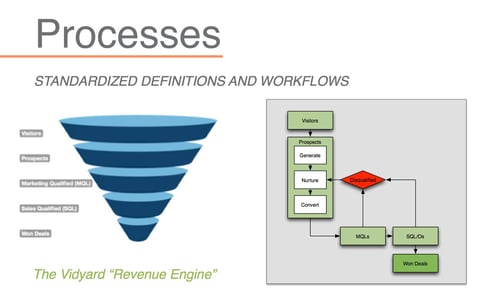This is part of a series of interviews with B2B revenue leaders. This interview is with Karen Hayward, Managing Parter at Chief Outsiders.
 Hi Karen, welcome to the blog! Tell us about Chief Outsiders.
Hi Karen, welcome to the blog! Tell us about Chief Outsiders.
Chief Outsiders is a firm made up of 60-plus CMOs that work on a part-time or interim basis for high growth and mid-market companies. We take our Fortune 1000 experience to the mid-market to help CEOs and their leadership teams realize their vision for growth.
Tell us about your role and your main responsibilities with the company.
I’m a Managing Partner for the West Coast operation. My role is everything from acquiring clients, executing our west coast go-to-market plan, building partnerships, recruiting CMOs and making sure we're operationally delivering on our brand promise.
If you don’t mind, could you take us through your career path, and how it led you to where you are today.
I started at Xerox in sales after graduating, then fast-forward 20 years and I was VP Marketing. I always flipped between sales and marketing, and I think that's kind of an unusual path. What I find is that most people I work with are an inch wide and a mile deep, and I'm probably a mile wide and an inch deep.
Starting out I worked for five years in sales, then moved to a marketing role where I took on the program management in Quebec for our first PCs which was failing miserably. To make a long story short, I packaged up a solution, validated it with the local market, and we outperformed the rest of the country combined.
From there, I took a sales management role, and then transitioned to an HR Ops role (one of the most interesting assignments I’ve had.) I learned all about sales compensation, people management issues, everything from soup to nuts about what could go right and wrong with turnover, recruiting, compensation, and budgeting.
I was asked to join the Xerox Canada leadership team as executive assistant to the CEO of the company. I saw at the highest level of the company how decisions get made, what's important, how to create support and coalitions for your ideas, and how to drive a strategic plan.
Beyond that I was Director of Marketing for a systems business then Vice President of Marketing and decided at that point it was time to move on and left Xerox for Silicon Valley. After some experience with startups, I wanted to work with mid-market companies in a consulting arrangement, and that’s when I stumbled across Chief Outsiders. It’s the company I've been preparing for my whole life.
Wow - that’s an incredible job history. How has all of that impacted the way that you tackle issues between sales and marketing today?
I’m going to answer that with one word: empathy.
When you can understand what it's like to walk in the shoes of the other person, and appreciate the pressures and the stress they're under, see things from their point of view, it can make for a partnership that is magical.
When teams are working off the same information, they generally come to the same conclusions. For example, if you're going to do lead generation and work with sales, you want crisp handoffs that can be measured in an objective way. Agreement on lead attributes like target demographics, job titles, revenue, employees etc. Attributes that can be measured and explicitly agreed upon are key. When you get visibility, agreement on lead definitions, the handoff process and timelines, and then openly share information, you can develop real trust and a strong partnership.
Is there anything that teams can do that you'd recommend to build that empathy between those two teams?
They need to meet and review each other's metrics every month. Leaders have to be talking every day and learning about each other’s worlds. That can include having team members do ride-alongs where you have someone on the marketing team spend a day every month either out in the field or sitting side by side outbound calling. Vice-versa as well, taking salespeople and showing them what marketing is doing; how we gather the voice of the customer; the set of inputs and insights that brought us to the conclusion that next program was going to be a killer success.
I believe that you benefit from having discrete leaders of each function, and there are good ways to work together. One is doing regular win-loss reviews and conducting them with an independent third party, so it's not the marketing voice and it's not the sales voice. That way, you find insights that enable the company to make better market based decisions to accelerate the desired outcomes.
The companies that Chief Outsiders does go into and help out, what do their sales and marketing teams typically look like?
It varies.
Working with a tech startup is very different than an industrial manufacturer that sells mechanical parts through distributors. The startups have begun their companies in a digital world and so they have different challenges. They're trying to scale and assess product market fit. For example, they are optimizing their digital footprints and prospecting teams of SDRs, working to make them productive.
With mid-market companies, many haven’t gone through a full digital transformation. Some are rooted in a world where in order to scale your company, you scale one salesperson at a time. For a mature mid-market company to accelerate growth, they need to take a step back and get insight into how their buyers have changed their purchasing process in the online world, and make serious adjustments for that.
There’s a fundamentally different landscape between those two types of companies.
The buying process has definitely changed. You wrote a post about the new sales and marketing funnel and how marketing is involved deeper down the funnel than it used to. What should both teams be doing differently to accommodate the change?
Both teams need to be measuring everything. That's where a solution like Varicent Lift's revenue intelligence is tremendous because it gives you insights into productivity on both sides. If clients are researching and shopping on the internet and you've adjusted your strategy, then marketing has to think about what it can do to equip the sales force.
There needs to be a constant feedback loop between sales and marketing. For example, what are the top 10 objections we're getting on a regular basis? How is marketing writing blog posts about those objections so that the answers are on their website? Is marketing continuously informing the sales force on how to handle those things? It's very much a circular loop.
Teach the sales force how to handle objections. There used to be a time when salespeople got really well trained by the large companies, and then the smaller companies would hire the Kellogg people, the IBM people, the Xerox people. They all came to mid-market companies or high-growth startup companies with a boatload of training behind them. That just doesn't happen anymore.
It's very important to have a culture where you're continuously teaching people frameworks and giving them guidance on how to execute. A fractional or freelance sales trainer can help you build out a method to address objections and develop your sales process skills, because that's a big issue in most sales forces today.
What do you think about marketing having a revenue target?
Well, I think it depends on your view of marketing.
We think about marketing in two buckets, big M marketing and little m marketing.
marketing:
If you are an organization that views marketing as activities like Press Releases, sales collateral, website, social media, figuring out trade shows, that's little m - marketing. That isl tactical execution. If marketing is tactical execution, then they don't control enough of the process to be accountable for revenue, in my opinion.
Marketing:
If you think of marketing as insight, strategy and execution, then that’s Marketing, and they should have a revenue number.
Marketing needs to have a seat at the executive table, and more than ever it's an integral driver supporting the entire client buying process. I'm totally aligned to having marketing as a key contributor with revenue accountability.
For companies looking to implement that marketing revenue goal, how should they go about doing that?
I've seen companies that make marketing accountable for sales-qualified leads and then don't give them a seat at the leadership team table. They struggle to understand how they impact sales-qualified leads as their only measurement when a large part of what they do is focused on generating top-of-funnel activities.
It works well when marketing is able to lead the growth strategy for the company and collaborate with sales and other functions on how to build the funnel and then agree on the measurements. Marketing may not be closing the deal, but the function is responsible for gathering the voice of the customer, developing the go-to-market strategy, sales enablement and the lead flow. Marketing can also take the lead in measuring everything and stack ranking performance to get heat and lights on all aspects of performance, identify opportunities and action plan the deficient areas.
If you can't measure it, you probably shouldn't be doing it.
Favorite resources:
Who everyone should follow right now on social media?
Well, my favorite is Kimberly Whitler. She is a professor at the Darden Business School. She's a topnotch CMO, and she is a writer with Forbes and CMO.com. I find her very insightful and she always leaves me thinking.
Favourite podcast:
I would recommend for blogging and podcasting a CEO by the name of Dan McDade. He runs a company called PointClear, and I think they are some of the best in the business of lead generation. Dan has been talking about sales and marketing alignment for years, and he does regular podcasts with experts. He blogs on a regular basis at pointclear.com.
Favourite book:
Given my background is both sales and marketing, I'm going to give you a sales book, and a marketing book.
- Dan McDade wrote a book called The Truth About Leads, and it is a pocket-size book, a super easy read that can help get marketing and sales on the same page around leads. I refer to that book over and over as I work with clients.
- My favorite marketing book is called Buyer Personas, and it's by Adele Revella. She has really changed my view on the importance of really knowing your buyer and defining how they buy. She gives you a detailed framework to execute in your own company. She's taken buyer personas to the next level.



